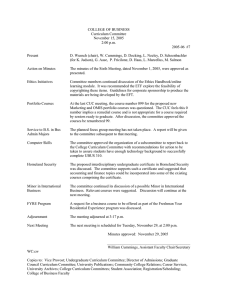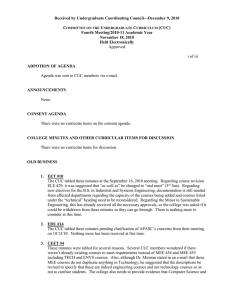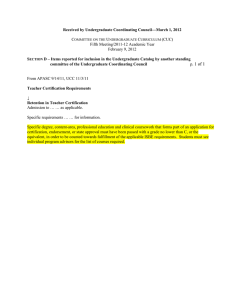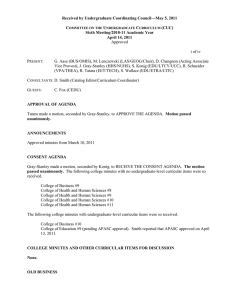Document 15173601
advertisement
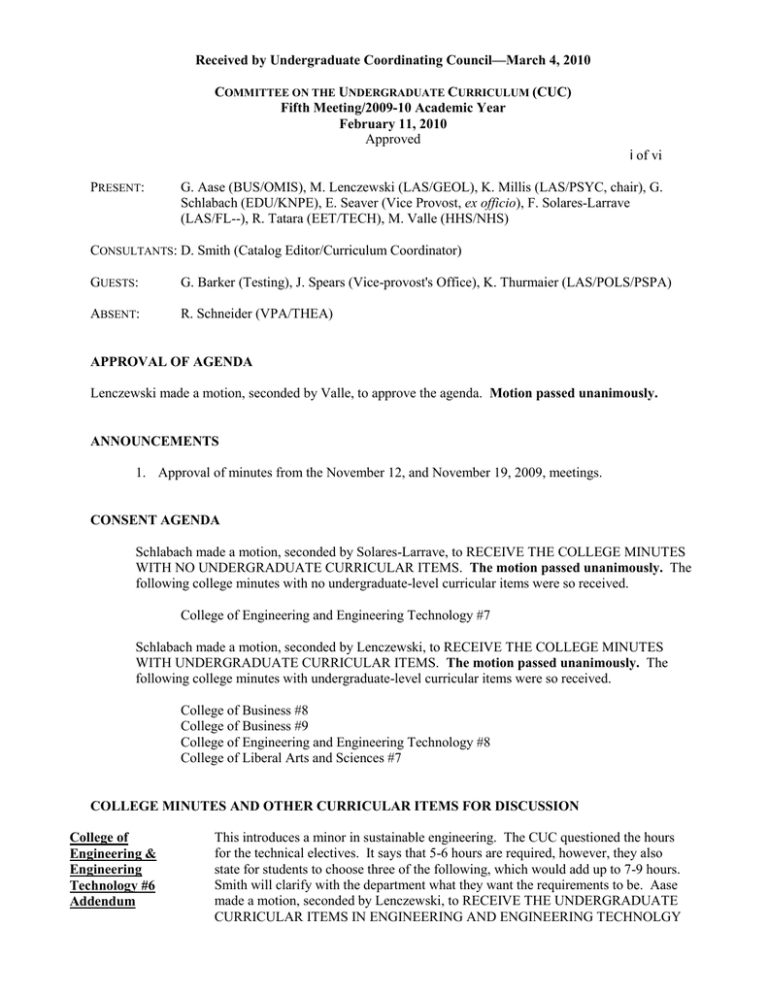
Received by Undergraduate Coordinating Council—March 4, 2010 COMMITTEE ON THE UNDERGRADUATE CURRICULUM (CUC) Fifth Meeting/2009-10 Academic Year February 11, 2010 Approved i of vi PRESENT: G. Aase (BUS/OMIS), M. Lenczewski (LAS/GEOL), K. Millis (LAS/PSYC, chair), G. Schlabach (EDU/KNPE), E. Seaver (Vice Provost, ex officio), F. Solares-Larrave (LAS/FL--), R. Tatara (EET/TECH), M. Valle (HHS/NHS) CONSULTANTS: D. Smith (Catalog Editor/Curriculum Coordinator) GUESTS: G. Barker (Testing), J. Spears (Vice-provost's Office), K. Thurmaier (LAS/POLS/PSPA) ABSENT: R. Schneider (VPA/THEA) APPROVAL OF AGENDA Lenczewski made a motion, seconded by Valle, to approve the agenda. Motion passed unanimously. ANNOUNCEMENTS 1. Approval of minutes from the November 12, and November 19, 2009, meetings. CONSENT AGENDA Schlabach made a motion, seconded by Solares-Larrave, to RECEIVE THE COLLEGE MINUTES WITH NO UNDERGRADUATE CURRICULAR ITEMS. The motion passed unanimously. The following college minutes with no undergraduate-level curricular items were so received. College of Engineering and Engineering Technology #7 Schlabach made a motion, seconded by Lenczewski, to RECEIVE THE COLLEGE MINUTES WITH UNDERGRADUATE CURRICULAR ITEMS. The motion passed unanimously. The following college minutes with undergraduate-level curricular items were so received. College of Business #8 College of Business #9 College of Engineering and Engineering Technology #8 College of Liberal Arts and Sciences #7 COLLEGE MINUTES AND OTHER CURRICULAR ITEMS FOR DISCUSSION College of Engineering & Engineering Technology #6 Addendum This introduces a minor in sustainable engineering. The CUC questioned the hours for the technical electives. It says that 5-6 hours are required, however, they also state for students to choose three of the following, which would add up to 7-9 hours. Smith will clarify with the department what they want the requirements to be. Aase made a motion, seconded by Lenczewski, to RECEIVE THE UNDERGRADUATE CURRICULAR ITEMS IN ENGINEERING AND ENGINEERING TECHNOLGY Received by Undergraduate Coordinating Council—March 4, 2010 COMMITTEE ON THE UNDERGRADUATE CURRICULUM (CUC) Fifth Meeting/2009-10 Academic Year February 11, 2010 Approved ii of vi #6 (10/22/09) ADDENDUM PENDING CLARIFICATION OF THE TECHNICAL ELECTIVE HOURS. Motion passed unanimously. College of Liberal Arts & Sciences #8 Millis explained that in these minutes is a proposal for two new courses, to be placed in two different places in the catalog, and a new center (Non-Governmental Organization Leadership and Development Center) and a new major offering (Community Leadership and Civic Engagement), to be placed in the catalog between two departments in the college. He added that the CUC not only needs to consider the new courses, center, and major, but also needs to consider where they are placed in the catalog. The issue is that centers are typically located in the section of the catalog titled “Other Academic Units.” However, no other center offers a major, and this new proposed center does. Seaver noted that CUC members may also want to keep in mind where it will be the easiest for students to find, and that in the end, the placement is a faculty decision. Thurmaier stated that with the catalog being online and searchable, it is his and the college’s preference that the center be treated as a department since it offers the major. Seaver pointed out that other centers offering programs that are listed in “Other Academic Units” are truly intercollege, interdisciplinary programs, where this new center and major belong only to Liberal Arts and Sciences. Discussion followed regarding faculty and Thurmaier clarified that there is a search for a director who will be the equivalent of a head of a unit and who also will teach the two new CLCE courses. The rest of the major course work at this time will be taught be faculty in other departments. Discussion followed regarding where the major should be placed in the catalog. Seaver asked that any motion addressing the placement be made separate from a motion to receive the minutes for future reference. The CUC also discussed some specific language in the major. Thurmaier clarified that for the B.A. degree, students not only need to fulfill the foreign language requirement, they also need at least three hours in foreign language literature or culture. On page 7, Lenczewski pointed out that under Option B, the courses listed do not make up the minor in environmental studies, so the parenthetical phrase needs to be deleted. Tatara observed that the descriptions for CLCE 100 and PSPA 401 are nearly identical. Thurmaier explained that CLCE 100 is an introductory course and PSPA 401 is a capstone course where students reflect on 100 or more hours of community service they have completed. The CUC suggested that for PSPA 401, the first sentence of the description should read, “Examination of the role of philanthropic ....” Tatara also asked about PSPA 411 and if there might be overlap with Philosophy. Aase asked about the revisions to the B.S. in Applied Management and that it looks like this degree is growing. Thurmaier explained that the POLS courses were place holders until the PSPA courses could be developed. The PSPA courses are replacing the POLS courses, so the requirements aren’t really increasing. Discussion followed regarding the needs met by the B.S. in Applied Management, other course work that could be required, and the potential for its growth. Lenczewski made a motion, seconded by Solares-Larrave, to RECEIVE THE UNDERGRADUATE CURRICULAR ITEMS IN COLLEGE OF LIBERAL ARTS AND SCIENCES #8 (11/18/09) WITH THE AFOREMENTIONED REVISIONS AND VERIFICATION OF NONDUPLICATION OF PSPA 411 FROM PHILOSOPHY. Motion passed unanimously. Schlabach made a motion, Received by Undergraduate Coordinating Council—March 4, 2010 COMMITTEE ON THE UNDERGRADUATE CURRICULUM (CUC) Fifth Meeting/2009-10 Academic Year February 11, 2010 Approved iii of vi seconded by Solares-Larrave, THAT THE NON-GOVERNMENTAL ORGANIZATION LEADERSHIP AND DEVELOPMENT CENTER AND THE MAJOR IN COMMUNITY LEADERSHIP AND CIVIC ENGAGEMENT BE PLACED IN THE CATALOG LISTED WITH THE COLLEGE OF LIBERAL ARTS AND SCIENCES MAJORS. Motion passed unanimously. College of Visual & Performing Arts #5 The proposal for a new minor in Theatre Studies was discussed. It was noted that two of the courses under “One of the following,” THEA 371 and THEA 475, have prerequisites of THEA 370, and THEA 370 and 371, respectively. Therefore if students elect to take either THEA 371 or THEA 475, they would also have to take at least one of the other courses, and then it would be more than “one of the following.” The CUC suggested that THEA 370 be moved to the required courses, THEA 371 and THEA 475 be moved to electives in Theatre Arts, and the hours for those electives be changed to 6-9. Lenczewski made a motion, seconded by SolaresLarrave, to TABLE THE UNDERGRADUATE CURRICULAR ITEMS IN COLLEGE OF VISUAL AND PERFORMING ARTS #5 (11/10/09) PENDING CLARIFICATION OF ISSUES MENTIONED ABOVE. Motion passed unanimously. OLD BUSINESS CEDU #1 At the 11/12/09 CUC meeting, new courses LTIC 445 and LTIC 447 were tabled for verification of nonduplication from English, Foreign Languages and Literatures. Also, Communicative Disorders should be contacted for verification of nonduplication for LTIC 447. At the 11/19/09 electronic CUC meeting, it was voted on to keep these on the table until receipt of nonduplication from the School of Allied Health and Communicative Disorders. It was noted that CUC received the requested verification of nonduplication in their materials for the February 11, 2010 meeting. Solares-Larrave made a motion, seconded by Lenczewski, to REMOVE THIS ITEM FROM THE TABLE. Motion passed unanimously. Aase made a motion, seconded by Solares-Larrave, to APPROVE THE NEW COURSES LTIC 445 AND LTIC 447. Motion passed unanimously. EET #16 New courses IEET 491 and IEET 492 were tabled in September pending clarification of whether or not undergraduate students will be able to enroll in the 500-level versions of the courses at a later point in time. At the October CUC meeting, committee members were provided with the response from the college, which they felt wasn’t satisfactory. At this meeting, the committee members accepted the college’s recent response. Aase made a motion, seconded by Caughron, to RECEIVE THE NEW COURSES IEET 491 AND IEET 492 AS AMENDED. This item remains tabled for additional feedback and clarification from the college. Minimum credit hours for minors and second majors. Seaver noted that any policy would also have to go through APASC and also that the colleges should be involved in the formulation of any policy. The CUC discussed some of the issues involved and should there be a subcommittee created to formulate a policy. Seaver stated that he will get this on the agenda of the Advising Group for Received by Undergraduate Coordinating Council—March 4, 2010 COMMITTEE ON THE UNDERGRADUATE CURRICULUM (CUC) Fifth Meeting/2009-10 Academic Year February 11, 2010 Approved iv of vi their feedback. CITC representative on the CUC. Seaver summarized the issue; the Committee on Initial Teacher Certification (CITC) feels that going through a separate curriculum committee for catalog changes that deal with initial teacher certification slows down the approval process. They would like to have someone with familiarity with those program attend CUC meetings and they agree to having that person being an ex-officio member of the CUC. That representative could answer questions about initial teacher certification programs and/or alert the CUC to any problems. The CITC also acknowledges that their by-laws would have to be revised to address the ex-officio member to the CUC. For teacher certification accreditation, NIU has to document how curricular changes are evaluated. Seaver added that the CUC by-laws would also have to be revised. He suggested that a CITC representative unofficially sit in on the CUC meetings next year on a trial basis, but the CITC should continue to operate under the current by-laws and hold CITC-CC meetings. Schlabach relayed the feelings of the College of Education’s associate dean, who also agrees that the CITC have an ex-officio representative on the CUC. The CUC agreed to have a CITC representative attend CUC meetings next academic year. NEW BUSINESS 1. Results of the national Survey of Student Engagement (NSSE), Julia Spears and Greg Barker Barker and Spears provided a presentation on the campus-wide results of the NSSE. Spears stated that this semester she and Barker have been making these presentations to groups similar to the CUC. It’s important to encourage student engagement because most data show that the more a student is engaged while in college, the more successful they are and the greater the chance that they will stay at that institution. There are two key components of engagement: 1) the amount of time and effort students put in to their studies and educationally purposeful activities and 2) the ways an institution uses its resources and organizes the curriculum and other learning opportunities to encourage student participation. Spears talked about what is the NSSE. It is administered by the Indiana University Center for Postsecondary Research and is a comprehensive assessment of effective practice in higher education. About 500 first-year students and about 600 seniors at NIU were surveyed, using a web-based instrument. Barker reported that the overall sample is representative of the NIU student population. Barker pointed out the NSSE benchmarks and noted that each question on the survey feeds into one of the benchmarks. He then explained the results for each of the benchmarks. Level of Academic Challenge measured the importance of academic effort and setting high expectations for student performance. Questions asked dealt with time spent preparing for class, the number and quality of assignments, course work, and reading materials. Barker noted that NIU compared well with other groups of NSSE institutions. Student-Faculty Interaction measured level of contact students had with faculty and their perceptions of faculty. Among questions asked were how much students discussed grades with instructors, did students work with faculty on activities other than course work, and the promptness of written and/or oral feedback. On this benchmark, NIU compared well with other groups of NSSE institutions. Supportive Campus Environments measured working and social relationships among different Received by Undergraduate Coordinating Council—March 4, 2010 COMMITTEE ON THE UNDERGRADUATE CURRICULUM (CUC) Fifth Meeting/2009-10 Academic Year February 11, 2010 Approved v of vi groups on campus. Questions asked dealt with how well the campus environment provides support to thrive socially and the quality of relationships with other students. The data shows that for this benchmark, seniors look better than first-year students. Active and Collaborative Learning measured how intensively involved students are in their education and how much collaboration with other students have they experienced. Questions asked dealt with how often students participated in class such as asking questions, making a presentation, tutoring other students, and participating in a community-based project. Barker pointed out that NIU seniors still performed as well or better than other groups of NSSE institutions. However, NIU firstyear students were below the other groups. Enriching Education Experience measured complimentary learning opportunities inside and outside of the classroom that augment the academic program. Questions asked dealt with participation in internships, study abroad programs, or independent study of self-assigned course work. For this benchmark, both first-year students and seniors are behind the other groups of NSSE institutions. Spears then presented the recommendations. She pointed out that they further explored enriching educational experiences as an improvement area. They discovered that NIU scored high in the area of interacting with students who are different from themselves. However, NIU scored low in other areas such as community service, learning communities, and study abroad opportunities. She and Barker are making this presentation with groups (including Baccalaureate Review Task Force and Foundations of Excellence) across campus to get feedback. Concrete activities have been developed. Examples of these activities include Themed Learning Communities, enhancement of undergraduate research programs, the creation of a program to encourage research earlier in a student’s career (Research Rookies), and the development of a campus-wide database of enriching research experiences that will be open to the entire campus community. Spears added that additional information on the NSSE results and NIU’s response can be found at the website at www.niu.edu/nsse. 2. Other catalog change from the Center for Black Studies The CUC discussed a minor revision to the minor in Black Studies. It was pointed out that since this is an interdisciplinary program, the CUC serves as the curriculum committee for this change. Lenczewski made a motion, seconded by Schlabach, to APPROVE THE REVISION TO THE MINOR IN BLACK STUDIES. Motion passed unanimously. 3. Process for checking with other departments regarding impact of course selection if out of college. Aase made a motion, seconded by Lenczewski, to TABLE THIS AND THE FOLLOWING ITEM DUE TO TIME CONSTRAINTS. Motion passed unanimsouly. 4. Template for certificates of undergraduate study. See above motion to table. 5. Revision to APPM, Honors Courses. This revision is to eliminate from the APPM the H as a letter that cannot be used in a new course number. Seaver noted that departments no longer need to create a separate honors course, only a separate section in the MyNIU course catalog. Aase made a motion, seconded by Lenczewski, to APPROVE THE REVISION TO THE APPM AS PRESENTED. Motion passed unanimously. Received by Undergraduate Coordinating Council—March 4, 2010 COMMITTEE ON THE UNDERGRADUATE CURRICULUM (CUC) Fifth Meeting/2009-10 Academic Year February 11, 2010 Approved vi of vi The meeting was adjourned at 2:20 p.m. The next meeting will be March 18, 2010, 12:30, Altgeld 225. Respectfully submitted, Donna M. Smith
